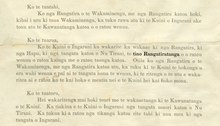
Back Tino rangatiratanga AN Tino rangatiratanga Catalan Maorská vlajka Czech Tino rangatiratanga Spanish Tino rangatiratanga Basque Maorien lippu Finnish Tino rangatiratanga French Tino rangatiratanga Galician Tino rangatiratanga Malay Tino rangatiratanga SIMPLE

Tino rangatiratanga is a Māori language term that translates literally to 'highest chieftainship' or 'unqualified chieftainship', but is also translated as "absolute sovereignty" or "self-determination," is central to Māori political aspirations. Many Māori advocate for tino rangatiratanga as a way to restore Māori control over their lands, resources, and cultural institutions.[1][2] The very translation of tino rangatiratanga is important to New Zealand politics, as it is used in the Māori version of the Treaty of Waitangi to express "full exclusive and undisturbed possession" over Māori-owned lands and property, but different translations have drastically different implications for the relationship between the 1840 signatories: the British Crown and the Māori chiefs (rangatira).[a]
It has become one of the most contentious phrases in retrospective analyses of the treaty amid debate surrounding the obligations that were agreed to by each signatory.[4][5] The phrase features in current historical and political discourse on race relations in New Zealand and is widely used by Māori advocacy groups.
- ^ English, Bill (7 May 2002). "The Treaty of Waitangi and New Zealand Citizenship". New Zealand Centre for Political Research. Retrieved 12 April 2020.
- ^ Te One, Annie; Clifford, Carrie (2021). "Tino Rangatiratanga and Well-being: Māori Self Determination in the Face of Covid-19". Frontiers in Sociology. 6: 613340. doi:10.3389/fsoc.2021.613340. ISSN 2297-7775. PMC 8022796. PMID 33869564.
- ^ "What does 'Tino Rangatiratanga' mean?", He Tohu, National Library of New Zealand, 10 May 2017, retrieved 28 September 2022
- ^ "1. – Treaty of Waitangi – Te Ara Encyclopedia of New Zealand". Teara.govt.nz. 13 July 2012. Retrieved 11 August 2015.
- ^ Orange, Claudia (13 July 2012). "Story: Treaty of Waitangi: Page 1 – Creating the Treaty of Waitangi". Te Ara: The Encyclopedia of New Zealand. Wellington, New Zealand: Ministry for Culture and Heritage. Archived from the original on 9 July 2015. Retrieved 7 August 2015.
Cite error: There are <ref group=lower-alpha> tags or {{efn}} templates on this page, but the references will not show without a {{reflist|group=lower-alpha}} template or {{notelist}} template (see the help page).